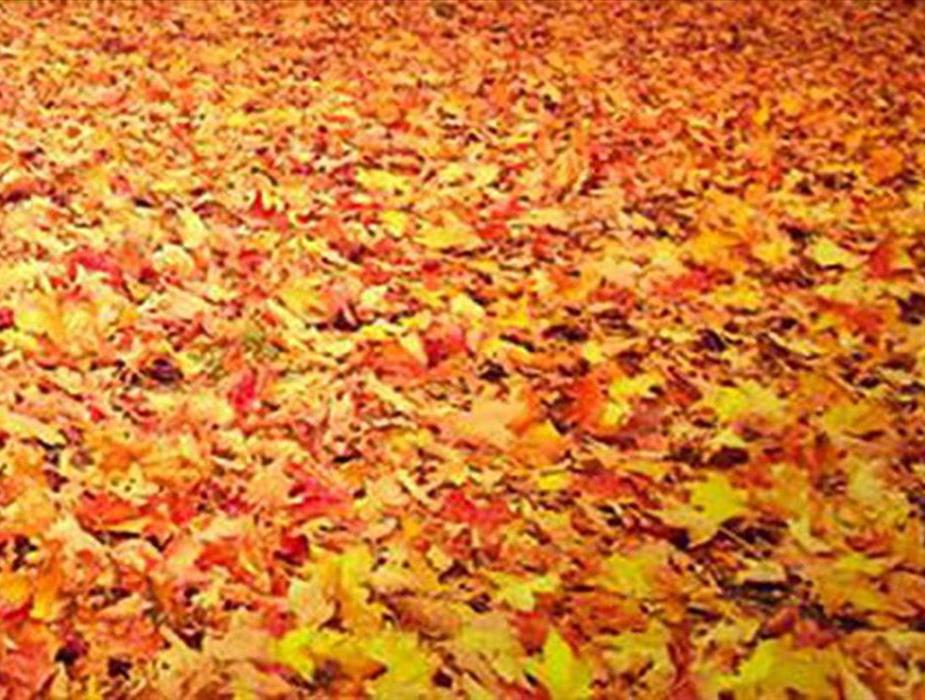Archived Blog Posts
Raccoons… And ‘possums… And squirrels… Oh, my!!
4/8/2021 (Permalink)
 Vermin are everywhere!
Vermin are everywhere!
Yes, these critters are quite cute!... BUT, do you really want them hiding in your home?! Some of them find their way into your attics when the weather turns cold in early winter and you may not even know they are there. You are probably thinking those little paw-steps are very large mice. Raccoons and possums can be very quiet during their winter semi-hibernation. These animals may make their way into these spaces as they are seeking safe nesting sites for the birthing and raising of their young. It is truly astounding how a tiny hole in siding, soffits, facia or roofing can be opened up by those little paws to make a grander entrance to your home – attics, walls, ceilings, crawl-spaces, etc. And oh, what a mess they make!!
So, if they have come to live with you, what can you do about this? If you know when they leave to get outside for feeding, you can take that time to patch in their entrance/exit sites while they are away. Upon their return, it is not unheard of them working hard enough to break into your well-planned attempts to keep them out. The best way to solve the issue permanently is to trap them. Professional disclaimer time: you will probably not want to do this yourself! You will want to find a licensed wildlife removal service. If this service does humane trapping and release, please make certain they release your houseguests many miles from their current habitat. You don’t want them returning to your house – or your neighbors’.
The mess they leave behind – also referred to as “raccoon latrines” – can cause serious health concerns. Things to consider are parasites – especially roundworms –, viruses, bacteria, and other microbial elements. Each one of these needs to be attended in order to return your home to a healthy, human-inhabitable condition, as many of these cross species to humans. Our staff is fully trained and certified to clean up after your critter houseguests.
If this is a disaster that has occurred in your home or commercial building, we can make it “Like it never even happened.” Call us. We can help you find someone to remove these “cuties,” talk with your insurance company about the restoration work needed and get your home back to full health.
Spring is here!... Or is it?!...
3/23/2021 (Permalink)
I do believe we are hosting the “50 Shades of Winter” this year! Well, eventually, we will be looking to get outdoors and work in our yards. It can be an exciting time, watching the flower bulbs planted last fall poke gentle shoots through the soil. They are generally determined enough and tough enough to weather a bit of continued cold. But what about that hose you forgot to disconnect from the outside water spigot last fall? Or what about the lawn sprinkler system that didn’t get drained properly? Or the outside water that didn’t get completely shut off before winter set in?
For as bitter cold as it was for a couple weeks in February, we would advise caution as you begin to use your outdoor water sources this spring. You may discover that winter did some damage, causing cracks or breakage of water lines. Often this means that water begins to spew into basements, sometimes at a great amount of volume and pressure. Since some of us don’t necessarily venture into our basements on a daily basis, this could come as quite a shock – and disaster!
As you turn on water for outdoor use, might we suggest that you have someone in the basement at the same time that could quickly shut off the water source? If there is a break, time is of the essence. This would reduce the amount of damage to the indoor, household space – and its contents, equipment and appliances. If you don’t have the extra set of eyes and hands, make a visit yourself shortly after turning on that water.
If you have any questions or concerns, please remember that we are here to help, to make your disaster “Like it never even happened.”
815.964.0599
How Not to Burn Your House Down with a Space Heater
2/15/2021 (Permalink)
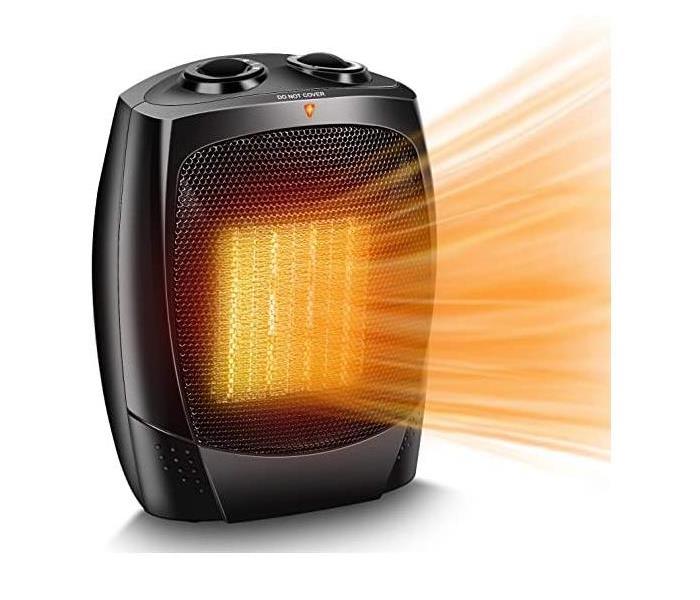 Space Heater
Space Heater
“How Not to Burn Down Your House With a Space Heater”
A recent article in the New York Times cited a personal near-disaster with a space heater by the author. This is scary stuff! And it happens so much more than most of us realize: there are an estimated 25,000 fires in homes and apartments due to space heaters each year; this causes more than 300 deaths; over 6,000 trips to the emergency room are attributed to such fires. In spite of these numbers, if we follow the do’s and don’t’s of use, space heaters are a safe way to supplement heat in small or specific spaces.
In confined spaces, electric, radiant and convection heaters are better options than combustion heat systems. Keep in mind that all heat production still causes heat and therefore, carries risk. These heaters are much safer now than what were manufactured in the past. They have better insulation. They have smaller grates to discourage small fingers and objects from coming into contact with the heat source. Many models are thermostatically controlled, so they shut off when a programmed temperature is reached. Sensors may detect blocked air passages. Some models have tip-over switches that shut the unit down if it is not flat on the ground.
Home or personal use space heaters must be approved by an independent testing laboratory for safety. Most recognized are Intertek (ETL) and Underwriters (UL). If you do not see a validation on the product, do not take a risk on it.
At this time, there are few space heaters with smart-home capabilities. Please consult Wirecutter’s for their picks of those that are available. It is recommended that you do not use a standard timing device for your heater. Due to the electrical demand of these products and the heat generated, timer devices are not designed for this usage. If your heater does not have a timer or you are insistent on commanding through voice activation, a plug-in smart outlet may offer some assistance. Wirecutter’s suggests Wemo Mini.
Go ahead! Use that space heater!... But… Here are some Safety Tips:
- Don’t crowd the unit. The 3ft rule is strongly suggested: keep the unit at lease 3ft away from combustible materials such as bedding, draperies, papers, clothing, etc.
- Examine the condition of the electrical cord. If it is frayed or damaged in any way, do not use. Also, it is not recommended to use extension cords, power strips, timers or multi connector plugs. Use only a wall outlet. Added layers of connection can overload the circuit or create additional resistance that can cause heat buildup, possibly resulting in a fire or internal electrical damage. If you must use an extension cord, make certain that it is a minimum of 14-guage.
- Make certain that the “plug is snug!” The heater must be plugged into the wall outlet securely, unable to come loose or fall out. If the power cord or wall outlet becomes hot to the touch, unplug the unit and consult an electrician. There is a problem!
- The heater should be placed on the floor in a very stable position, in a spot where it is unlikely to get knocked over. Do not set on a table, chair or any surface that is or could become unstable.
- Do not use the heating unit in or near water, or if you are wet. Otherwise, you will be shocked as a result… Literally, shocked!!
- Do not “hide” cords under rugs, furniture or carpets. This can prevent the heat from escaping that is created by the resistance in the electrical cord. Be careful not to pinch, bend or crimp the cord. This can impede the electrical current and contribute to the buildup of heat and energy.
- Make certain that your smoke and carbon monoxide detectors are functioning properly.
- Use a space heater designed for the space you have determined. Too large of a unit will overheat the space and use more electrical resources than necessary.
- Train and teach everyone in the household the proper use, operation and care of the unit. Small children should be taught to stay away for safety purposes. Turn the unit off when asleep, in a different room or when unable to keep an eye on it.
- For combustion heaters, use the right kind of fuel. Substitutions can cause a fire and the malfunctioning of the unit. Never use fuel-burning units in a closed environment, such as your home. Proper ventilation is crucial when used in an enclosure.
Stay warm this winter. Space heaters afford us intimate heat sources in an environment that may not meet our individual needs for comfort. Most of all, stay safe!
Christmas Candles
12/23/2020 (Permalink)
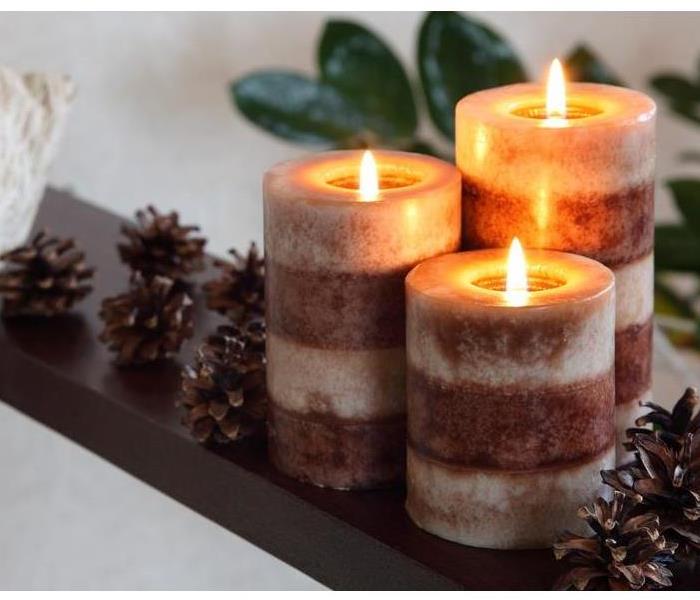 Beautiful candles
Beautiful candles
“In the warm yellow glow of the Christmas Candles
I see the magic of Christmas shining bright, shining bright…”
From Christmas Candles by Breen, LeVeen, Sampson
The fragrance and ambience of candles have long-outlived their pragmatic use as a source of light in our modern world. Yet, they continue to be a part of almost every household, especially at the Holidays: so many fragrances, so many shapes and styles to suit the occasions!
As you enjoy the warmth of candlelight and the sensory pleasure of the seasonal aromas, we wish for you to be safe burning your candles. There is no need for many to be concerned about burning candles on Christmas trees, but please be cautious throughout your decorated homes. Fires caused by burning candles have destroyed more than one family’s holiday season.
Please be vigilant in your use of candles, making sure to always keep an eye on them as they burn:
- Keep from touching other decorations, i.e., greens, ribbons, silk flowers.
- Try to use candles in containers: jars, votive glass, etc.
- Place columns, 3-wicked candles, tapers and other free-standing candles on a fire-resistant tray or in a bowl. Monitor the wax flow that may occur as the edge cracks.
Not all candles are created equal. Many inexpensive candles contain inorganic materials that, when burned, can send toxins into the air of our enclosed spaces. They often give off more soot, too. Quality soy candles and fragrances from essential oils will still release soot into the air, but generally burn cleaner. Keeping any burning candle away from walls and ceilings will reduce the chance of soot residue staining those surfaces.
A candle’s flame is often seen as Holy Fire. Please, let’s keep it that way. May your holidays, however you celebrate, be merry and blessed!
O, Christmas Tree!
12/18/2020 (Permalink)
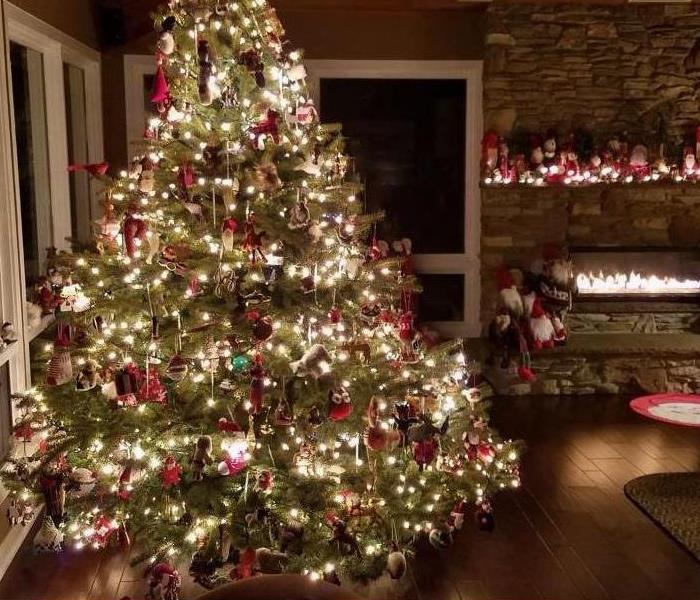 O, Christmas Tree!
O, Christmas Tree!
O, Christmas Tree! O, Christmas Tree! How lovely are your branches…
Families are decorating their holiday trees, many purchasing fresh trees, some for the first time. They are lovely and fragrant and offer a wonderful touch of nostalgia, often remembering the holidays at the grandparents.
If you are enjoying a fresh tree, please remember that they need special attention. Place it away from heat sources to keep it from drying to quickly – and from possibly catching fire.
Place it out of traffic patterns in your home in order avoid tripping hazards of a bump in the night. So many times, the furniture is rearranged to make the appropriate space for the tree in the room and family members must retrain themselves to new traffic patterns.
Beware of electrical hazards! Although a fresh tree, as it dries throughout the season, is at greater risk of catching fire with faulty wires in strings of lights, artificial trees are not exempt from this danger. Make certain that all wires are in good condition before hanging them on the tree. If it is a pre-lit tree, check the safety of those wrapped wires and connections.
No matter what type of tree you are using to decorate for the holidays, DO NOT OVERLOAD CIRCUITS!! This is one sure way to set things ablaze and ruin the holidays.
When leaving the house for holiday shopping or other festivities, it is a wise thing to unplug or turn off the holiday electrical elements: cords, strings of lights, the train set under the tree, etc.
Enjoy the sights, sounds and smells of the Holidays!
We wish you Happiness and many Blessings in the coming year!
May 2021 bring us good health and a return to the loved ones we are missing!
It's Virtually the Holidays
12/8/2020 (Permalink)
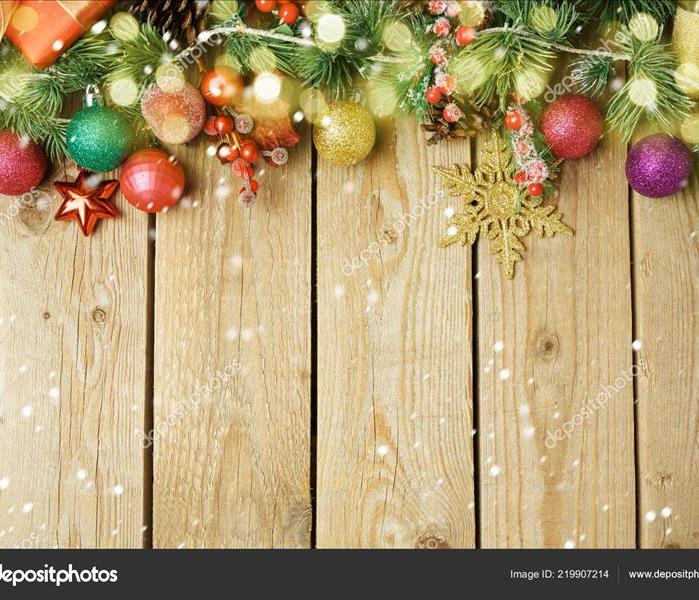 Happy Holidays!
Happy Holidays!
As we came out of our first month donning the world of virtual family gatherings, we step into a second month of those possibilities. Many of us find ourselves questioning how we are going to make the festivities we celebrate in December feel joyous. We find ourselves struggling with what it will all look like, how the logistics need to line up and work out, and it's causing additional holiday stress.
As we have been organizing things with our families we have pondered many questions. How? When? Will we have a meal together somehow? Open gifts? Share some spirits? What platform will we use? How much time do we need to set aside? How are we going to feel?
Keep this in mind. The season is meant to bring cheer, don't lose sight of that. Try not to stress all the little details of your time together, they will fall into place. You will ultimately feel what you want.
As someone who is adjusting to their best friend moving thousands of miles away during a pandemic (making it impossible to physically visit), we have learned how to make things seem more like we are still together. Here are some suggestions to make it feel a little more "normal".
- Virtually bake together
- Prepare a meal together
- Build a gingerbread house together
- Watch a movie together (we stream and try to just start at the same time)
- Open gifts together on a video platform
- Take turns opening them
- Host a virtual secret santa
- Cheers a virtual drink the same way
- Setup a video gaming campaign
There are several video chatting services available. FaceTime, Facebook video, Alexa Show, Zoom, Teams, and Google connect are just a few.
Remember, it's a time for cheer. We hope you all have happy holidays, however possible!
COVID and Region 1
11/9/2020 (Permalink)
Our Region 1 is designated for “Resurgence Mitigations” after the rise in Covid-19 cases above the state threshold!
Outwitting the Pandemic Takes Patience.
It is apparent to all that Covid-19 will be with us for quite some time to come. The anticipated flu season could bring even more unwelcome concerns. It is certainly not a time to become complacent about our health routines, no matter how frustrated we may become. Keep wearing your mask; continue to physical distance; avoid large gatherings; cover your cough – and your sneeze (those of us with allergies can clear a space in a hurry!); wash your hands thoroughly; stay home if not feeling well.
Remember that cleaning and disinfecting high-touch areas in shared space will help to keep others safe, too. Not sure what to do or continue doing to maintain the health of home or workplace? Follow us on Facebook and LinkedIn or contact us for information or a consultation.
The only way we will ALL come through this world-wide health calamity is to follow the science and deeply care about one another.
Falling for Leaf Burning
11/4/2020 (Permalink)
For some of us, fall is the favorite time of year. There is a crispness in the air that rouses a sluggish body from the stifling days of heat and high humidity. The colors of fall foliage fill the air with almost fluorescent colors. The smells are pungent as Mother Nature drops leaves, seeds and nuts to find their new homes to ready for winter shelter and new life in the spring. There are apples and cider and pumpkins and squash and heady spices used in baking and mulling. And for many, there is the fall ritual of burning leaves.
With any type of burning, SERVPRO of Rockford would like you to remain safe in this leaf-burning activity:
- Where will you burn that hefty pile? Make certain that it is far enough away from buildings and other flammable materials.
- Be prepared! Make certain that you have a handy water supply, a metal rake to keep the leaves contained and a shovel to control escaping flaming materials.
- Be courteous of neighbors. Smoke that smells delightful to our senses, may contribute to another’s allergies, including asthmatic responses. Also, don’t burn with a breeze towards the neighbor’s house.
- Don’t burn on a windy day! This will send sparks and burning leaves to places you will not wish them to be, placing your property and possibly the neighbor's at risk.
- Be aware of local regulations regarding burning. Each community or county has its own regulations. Here are the links for the City of Rockford and Winnebago County:
Stay safe and enjoy your fall activities!
Here to Help during this time of need
3/18/2020 (Permalink)
 Covid-19: Here to Help
Covid-19: Here to Help
SERVPRO of Rockford is Here to Help during this time of need
Why turn to SERVPRO?
We are Cleaning Experts
During this unprecedented time caused by the global pandemic of coronavirus, this is a reminder to our customers that we are specialists in cleaning services, and we adhere to the highest cleaning and sanitation standards.
Specialized Training
We are prepared to clean and disinfect your home or business, according to protocols set forth by the Centers for Disease Control and Prevention. We have years of experience in dealing with biological contaminants, and we will go beyond the scope of work that regular janitorial staff perform on a daily basis.
The CDC encourages cleaning of high-touch surfaces such as counters, tabletops, doorknobs, light switches, bathroom fixtures, toilets, phones, keyboards, tablets and tables. Other spaces mentioned in the CDC’s guidance for commercial spaces include:
- Kitchen/Food Areas
- Bathrooms
- Schools/Classrooms
- Offices
- Retail Spaces
- Water Fountains
- Shelving/Racks
- Sales Counters
- Carpets and Rugs
- Stair Handrails
- Elevator Cars
- Playground Equipment
- Fitness Equipment
Specialized Products
The CDC recommends usage of a labeled hospital-grade disinfectant with claims against similar pathogens to the coronavirus. Multiple products in the SERVPRO product line carry the EPA-approved emerging pathogens claims. While there is currently no product tested against this particular strain of the coronavirus, we are following all guidelines as provided by the CDC and local authorities.
Call Today for a Proactive Cleaning
If your home or business needs deep cleaning services, call the experts today –
SERVPRO of ROCKFORD, 815-964-0599
Sources:
https://www.cdc.gov/coronavirus/2019-ncov/hcp/guidance-prevent-spread.html?CDC_AA_refVal=https%3A%2F%2Fwww.cdc.gov%2Fcoronavirus%2F2019-ncov%2Fguidance-prevent-spread.html
https://www.cdc.gov/coronavirus/2019-ncov/specific-groups/guidance-business-response.html
Fall Preparation for Winter
12/9/2019 (Permalink)
Did you get those gutters cleaned and cleared before the cold weather came upon us? Did you disconnect the outdoor hoses? And shut off the outside spigots? There will still be some above freezing days coming our way in order to get that done. They just won’t be warm tasks to complete!
If you do not get these outdoor chores completed, the brutal cold of a polar vortex could make your life even more inconvenient and uncomfortable. Those clogged gutters won’t allow the melting snow from the roof to flow easily or freely. Since water seeks the path of least resistance, it will cascade over the gutters onto sidewalks, landings and other walkways. This makes for dangerously icy walking spaces. As it makes its way closer to the foundation of your home, it may find a way through your foundation into your home… Remember the note about the path of least resistance?!
That snow on the roof that spills over the gutters can become ice dams, damaging roofing, soffits, facia and gutters from the sheer weight of ice and snow. The water from this can often make its way along the inside walls of your home. Wet ceilings, walls, insulation, flooring and baseboards can make such a mess. Left to dry on their own, they can soon harbor mold. The roof itself can be damaged and continue to have leakage problems. (NOTE: Do not use standard rock salt on your roof! Calcium Chloride based products are safer for roofing materials and will work at lower temperatures.)
If that hose is still connected or the water has not been shut off to those outside spigots, freezing weather causes the water in those lines to expand. Breaks and cracks are frequently the result. Where does the water from those broken lines go? Back into the house, of course, where it is warmer and the water can flow freely! What a mess!
Yes, “Baby, it’s cold outside!” But it will only get colder as winter progresses. Take advantage of the next warmer – above freezing – day and get those outside chores completed. Otherwise, you will find yourself needing to call SERVPRO of Rockford to make those water damages “Like it never even happened.”






 24/7 Emergency Service
24/7 Emergency Service





